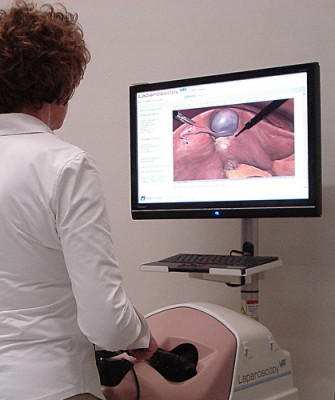In the new James Bond movie, there’s a testy exchange between the wizened superspy and the young man he’s just discovered is his new Q. “Age is no guarantee of efficiency,” Q says to Bond, who retorts, “And youth is no guarantee of innovation.”
A surgeon performs a simulated gall bladder removal. (PHOTO: OREGON STATE UNIVERSITY)

Googling how often that quote, or parts of it, shows up online suggests Bond won that particular exchange. Age wins another point in the operating room. New research finds that novice surgeons do a poorer job of filtering out distractions than it’s thought do the old pros, and being distracted can mean making a serious, or even deadly, mistake.
In an innovative experiment rigged by members of the industrial engineering faculty at Oregon State University and the general surgery faculty at the Oregon Health and Science University, 18 second-, third- and research-year surgical residents were asked to remove a gall bladder using a minimally invasive technique known as laparoscopic cholecystectomy.
As a release from OSU explains:
While the young surgeons, ages 27 to 35, were trying to perform this delicate task, a cell phone would ring, followed later by a metal tray clanging to the floor. Questions would be posed about problems developing with a previous surgical patient—a necessary conversation—and someone off to the side would decide this was a great time to talk about politics, a not-so-necessary, but fairly realistic distraction.
In eight of the 18 of the operations with distractions coming at critical junctures, “major surgical errors” were committed, compared to just one in 18 when there were no planted distractions. Those errors—damage to arteries, bile ducts, or other organs—can be fatal.
If you’re still holding your breath worrying about the subjects of those surgeries, relax. The surgeons were working on a virtual reality simulator and not real patients, something the study’s authors concede was a principal, if necessary, limitation. And the volume of distractions was also greater than might be expected in real life.
Engineering professor Robin Feuerbacher suggested that older surgeons were less likely to be jarred. “Human factors research indicates that experienced task performers are more tolerant of distractions and can better manage interruptions,” wrote Feuerbacher, the lead author of the paper that appeared in the journalArchives in Surgery. And distractions, whether at the scalpel or the behind the wheel, are always with us.
“We’ve presented these findings at a surgical conference and many experienced surgeons didn’t seem too surprised by the results,” Feuerbacher was quoted by OSU. “It appears working through interruptions is something you learn how to deal with, and in the beginning you might not deal with them very well.”
Nonetheless, continuing research will examine whether that age hypothesis proves accurate.
Looking over their results, the researchers found that the side conversation about the earlier patient resulted in the most mistakes, followed by the chit-chat about politics. Unexpectedly, all the eight serious errors logged occurred in afternoon surgeries, although not all the residents started their shifts at the same time. The authors wondered if the “statistically significant result” could be attributable to daily rhythms, whether the doctors ate lunch of if they quaffed any caffeine.
In a second part of the experiment, the young docs were asked to memorize something important that they were expected to announce near the end of the operation. Ten of the distracted surgeons forgot, compared to four of the uninterrupted ones.
While the research clearly shows that engineering a distraction-proof operating room is important, it also reinforces the idea that experience matters.
As Judi Dench’s M quoted Tennyson during one of the non-exploding scenes in Skyfall:
Though much is taken, much abides; and though/
We are not now that strength which in old days/
Moved earth and heaven, that which we are, we are… /
One equal temper of heroic hearts,/
Made weak by time and fate, but strong in will/
To strive, to seek, to find, and not to yield.




